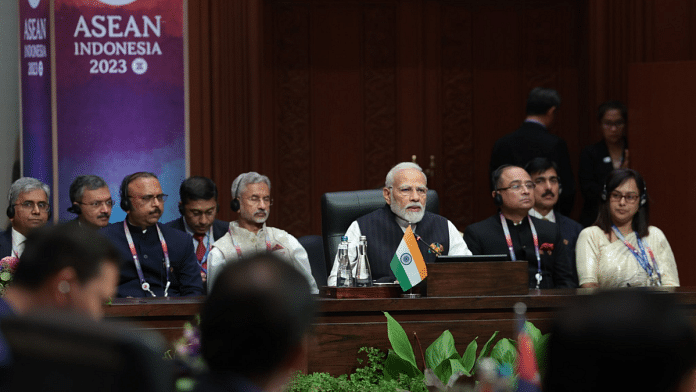New Delhi: Prime Minister Narendra Modi on Thursday announced the decision to establish an embassy in Dili as a “reflection of the importance” that India attaches to ASEAN and its relationship with Timor-Leste.
The announcement was made during the ASEAN-India Summit held at Jakarta.
Timor-Leste, a Southeast Asian country with a population of 1.34 million as per World Bank data, declared independence from Portugal in 1975, but was occupied by Indonesia till 1999.
In 2002, the UN recognised its independence. That year, Timor-Leste joined ASEAN as an observer and after the 40th and 41st ASEAN Summits, ASEAN agreed in-principle to admit it as the eleventh member.
Modi attended the 20th ASEAN-India Summit and the 18th East Asian Summit in Jakarta Thursday.
During his opening remarks at the ASEAN-India Summit, the PM highlighted the fact that the relationship is entering its “fourth decade.”
“India and ASEAN have both historical and geographical links. Our shared values, regional unity and our shared belief in peace, prosperity and a multipolar world also bring us together,” Modi said.
“ASEAN is a central pillar of India’s Act East Policy. India fully supports ASEAN centrality and the ASEAN outlook on the Indo-Pacific. ASEAN has an important place in India’s Indo-Pacific initiative,” he added.
’21st century is Asia’s century’
Modi asserted that the 21st century belongs to Asia. “The 21st century is the century of Asia, it is our century. For this, it is essential that we build a rules-based post-COVID world order and that we make collective efforts for the welfare of mankind,” he said.
“The progress of free and open Indo-Pacific and elevating the voice of the Global South is in the common interest of all… India is committed to working shoulder to shoulder with you.”
The prime minister described how ASEAN matters stating, “ASEAN matters because here everyone’s voice is heard, and ASEAN is the epicenter of growth because the ASEAN region plays a crucial role in global development.”
He emphasised the need to complete the review of the ASEAN-India Free Trade Agreement in a timely manner. As ThePrint reported, the trade deficit with the ASEAN member states stood at $43.57 billion in 2022-23.
Modi also presented a 12-point proposal for strengthening India- ASEAN relations. The proposal covered connectivity, digital transformation, trade and economic engagement, addressing contemporary challenges, people-to-people contact and deepening strategic engagement, according to a press release of the Ministry of External Affairs.
The proposal suggested the establishment of multi modal connectivity that links Southeast Asia to Europe, via India and West Asia.
The PM also offered to share the Digital Public Infrastructure stack to ASEAN members, and announced the creation of an ASEAN-India fund for Digital Future focusing on cooperation in digital transformation and financial connectivity.
Amongst other proposals, Modi invited ASEAN members to join the Global Centre for Traditional Medicine being established by the World Health Organisation (WHO) in India, called for a collective fight against terrorism, terror financing and cyber disinformation, as well as cooperation in disaster management.
Two joint statements on maritime cooperation and food security were adopted at the ASEAN-India Summit.
Also Read: Behind the scramble for ASEAN: China to US, top economies court Southeast Asia at Jakarta summits
‘Peace & prosperity in interest of all’
At the 18th East Asian Summit, Modi said, “peace, security, and prosperity in the Indo-Pacific region, is in the interest of us all.”
“It is imperative to adhere fully to international laws; And everyone’s commitment and joint efforts are also necessary to strengthen the sovereignty and territorial integrity of all countries. As I have said before – today’s era is not of war. Dialogue and diplomacy is the only path to resolution,” he added.
The PM echoed the statements made by the chairman of ASEAN and Philippine President Ferdinand R. Marcos Jr. Wednesday, calling for an “effective” Code of Conduct for the South China Sea in accordance with the United Nations Convention on the Law of the Sea (UNCLOS) and international law.
“The need of the hour is such that an Indo-Pacific — where international law, including UNCLOS, is equally applicable to all countries; where there is freedom of navigation and overflight; and where there is unimpeded lawful commerce for the benefit of everyone,” Modi added.
The PM further said the interests of countries “not directly involved in the discussions,” should also be taken into consideration.
Regarding Myanmar, he stated that India has taken the views of ASEAN into account, but as a neighbouring country – ensuring peace and security on the borders and enhancing India-ASEAN connectivity – is also the focus.
‘Lack resources to respond humanitarian tragedies’
At a media interaction ahead of the 13th ASEAN-UN Summit, United Nations Secretary-General António Guterres, said that there has been a “meaningful decrease” in international financial support for the Rohingya refugees who fled to Bangladesh.
“It is time for international financial support for Myanmarese inside and outside the country to be re-established at the necessary levels because we are witnessing an enormous tragedy and we lack the resources needed to respond to it,” Guterres added.
On a question regarding the G20 Summit in New Delhi, Guterres said, “I am confident that India will do everything possible to make sure the geopolitical divides that exist are overcome and that the G20 can conclude with positive results.”
For Guterres, the essential questions that need to be answered during the G20 Summit are — a clear message on the reform of the international financial architecture and to create conditions for debt relief and access to long-term concessional funding, to help developing countries overcome the impacts of Covid and Ukraine war.
He also called for a permanent representative from Africa to the UNSC and supported the membership of the African Union to the G20.
(Edited by Tony Rai)



